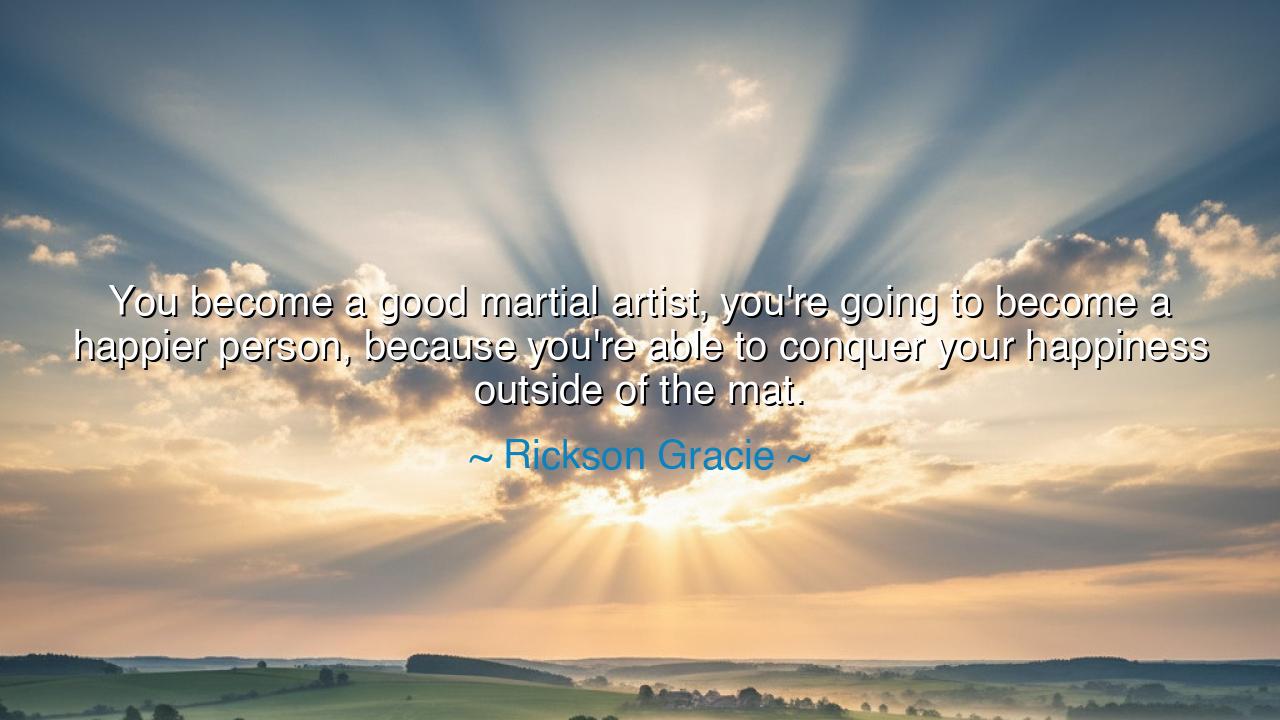
You become a good martial artist, you're going to become a
You become a good martial artist, you're going to become a happier person, because you're able to conquer your happiness outside of the mat.






Hear now the words of Rickson Gracie, master of discipline and serenity, who said: “You become a good martial artist, you’re going to become a happier person, because you’re able to conquer your happiness outside of the mat.” Though spoken by a warrior of modern times, these words carry the weight of ancient wisdom. For they teach that the path of mastery is not merely about defeating others, but about subduing the chaos within. The true battlefield is not the arena of combat, but the restless landscape of the mind. To train in art and discipline is to learn the secret of harmony — that through struggle, humility, and perseverance, one may find happiness not as a gift of chance, but as a conquest of the soul.
The origin of these words lies deep within the heart of the Gracie philosophy, born from the martial art of Brazilian Jiu-Jitsu, which Rickson inherited and refined. In that art, strength alone is meaningless; patience, timing, and calm are the true weapons. On the mat, a student learns to face defeat, to breathe through pain, to find stillness amid turmoil. These lessons, though learned in combat, are the very essence of life itself. For every man must one day wrestle with adversity, fear, and pride. And when the warrior learns to control his body and his breath, he discovers that the same discipline that brings peace in combat also brings peace in the heart. Thus, the martial artist becomes the philosopher, the fighter becomes the sage.
The ancients understood this long before the modern age. The samurai of Japan followed the Bushido — the Way of the Warrior — not only as a code of combat, but as a spiritual path. They meditated on impermanence, practiced humility, and sought clarity in the stillness of motion. The Chinese masters of Kung Fu trained in solitude not to learn how to harm, but how to live. And in the mountains of Greece, even the athletes of the old Olympiad sought not only victory but arete — excellence of the soul. So too does Rickson Gracie’s wisdom echo their truth: that happiness, like mastery, is not found in comfort, but in the quiet joy of self-command.
To “conquer your happiness outside of the mat” is to realize that victory in the external world means nothing without peace in the internal one. Many men fight others, yet remain slaves to anger and ego. They win battles and lose themselves. But the true martial artist — and indeed, the true human being — learns to apply the discipline of training to every part of life. The patience that endures a choke becomes the patience that endures hardship. The humility that bows before a teacher becomes the humility that listens before judging. The control that prevents violence becomes the control that prevents sorrow. The mat, then, is but a mirror — and the lesson learned upon it must be carried into the world beyond.
There is a story told of Miyamoto Musashi, the greatest swordsman of Japan, who fought over sixty duels and never lost. Yet in his final years, he cast aside his sword and withdrew to the mountains. There, he wrote The Book of Five Rings, where he revealed his final truth: that the purpose of combat was not the killing of others, but the perfection of oneself. “The ultimate aim of strategy,” he wrote, “is to find peace.” So it is with Rickson Gracie’s words — they speak not to the fighter alone, but to every soul that struggles against life’s storms. For every man and woman stands upon a kind of mat, each day confronted with their fears, their failures, and their pride. To live well is to fight well — with balance, grace, and presence.
Yet the lesson does not end in philosophy alone; it demands practice. The one who seeks happiness must train as the warrior trains. He must rise early to meet his doubts, breathe deeply in moments of tension, and act with intention in all things. He must learn that control begins not with others, but with himself. He must make peace with imperfection, for mastery is a journey, not a destination. Just as the martial artist refines his technique each day, so must every person refine their heart — through kindness, patience, and courage.
So remember this, O listener: the world beyond the mat is itself a dojo — every challenge, every sorrow, every triumph, a test of your spirit. The art of living, like the art of fighting, demands awareness, humility, and discipline. And when you, like Rickson Gracie, can face the storms of life with the same calm that you face an opponent’s strike, you will have conquered your happiness indeed.
Therefore, live as the warrior lives — not in aggression, but in mastery of self. Seek no victory over others, but over your own weakness. For when you have subdued the restless mind and strengthened the steadfast heart, you will find what every master, from the samurai to the sage, has sought since time began: a happiness unshaken by the world, born from the harmony of body, mind, and soul.






AAdministratorAdministrator
Welcome, honored guests. Please leave a comment, we will respond soon